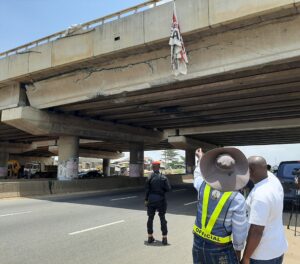A potential tragedy looms on the Lagos-Ibadan Expressway as the Lotto Interchange Bridge, damaged by two separate truck accidents in recent months, continues to deteriorate posing an urgent threat to the thousands of motorists who rely on the route daily.
The bridge, part of the yet-to-be-completed interchanges along the highway, was first hit in April by a low-bed truck transporting an excavator. The equipment, reportedly not lowered to meet the 5.6-metre clearance, crashed into the overhead beams. Although the driver was arrested, there has been no update on any legal proceedings since the incident.
Just weeks later, another heavy-duty vehicle conveying a large tank for the Nigerian National Petroleum Company Limited struck the same already weakened structure, compounding the damage. Currently, parts of the concrete beams hang dangerously above traffic, drawing public concern and highlighting official inaction.
Federal Controller of Works for Lagos State, Olukorede Kesha, confirmed that five structural beams were affected—two of which require total replacement. She said engineers will conduct a comprehensive study to assess the full extent of the damage and the implications for traffic flow on the critical expressway.
This is not an isolated problem. Similar damage has been reported at other interchanges like Ibafo, while pedestrian bridges in locations such as Keffi and Alapere have collapsed or been severely weakened by collisions with oversized trucks. In the Keffi incident, two people lost their lives and two others sustained injuries when a truck ran into the lone pedestrian bridge in the area.

Authorities estimate the Lagos-Ibadan Expressway accommodates over 40,000 vehicles daily, making structural integrity a matter of national importance. However, weak enforcement of traffic laws, unchecked overloading, and driver recklessness continue to compromise the infrastructure. Trucks often exceed height limits, ram into bridges, or park on them for extended periods, further weakening the structures.
Despite occasional clampdowns like the Lagos State Government’s recent seizure of 10 trucks for violating Third Mainland Bridge access rules offenders are rarely prosecuted with the seriousness their actions warrant. Experts argue that this impunity encourages further violations.
The situation at the Lotto Bridge, in particular, has raised calls for systemic reform. Analysts say a collapse would not only lead to casualties but also paralyse a major transportation artery. To avert disaster, they urge the federal government to accelerate completion of the highway and institute far-reaching reforms.
These include enforcing load restrictions, erecting clear headroom signage, prosecuting violators, and making them bear the cost of damages much like the U.S. state of Massachusetts, which recovered $500,000 in repair costs from a transport company after a similar bridge incident.
Experts also recommend separating truck lanes, restoring weighbridges, deploying surveillance technology, and resuscitating rail and seaport infrastructure to reduce pressure on highways.
As the Lotto Bridge continues to hang by a thread, the message is clear: without decisive action, Nigeria’s busiest highway could become the scene of its next avoidable disaster.



